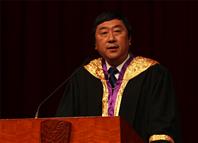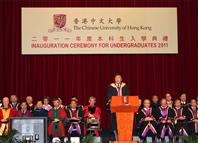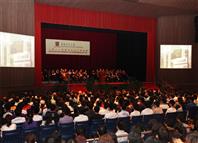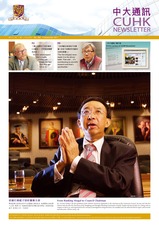On 5 September, Prof. Joseph J.Y. Sung, Vice-Chancellor, welcomed freshmen of the University with his address ‘Responsibilities and Rights in an Interdependent World’ at the Inauguration Ceremony for Undergraduates 2011.
'Responsibilities and Rights in an Interdependent World'
Let me be the first to welcome you to The Chinese University of Hong Kong.
Choosing to be here on this campus, studying what you are planning to study, and affiliating yourself with the College of your choice, are probably the first important decisions that you have made in your life … and I want to tell you that you have made some brilliant decisions. You are here to acquire new knowledge (general as well as professional), you are here to acquire social skills, and you are here to grow up from a teenager to become a mature adult who can take responsibilities of your life. But, ladies and gentlemen, I want to tell you that you have to do more than that.
Our world is no longer the same world as it used to be. Financial turmoil in one country can determine the economic health of practically the four corners of the earth. Carbon dioxide emissions from one country can affect the global climate, and hence the vegetation and livestock of many of its neighbours. An epidemic of infectious disease in one city can be spread to many countries, or even continents, within a matter of days. Yes, we all know and realize that we live in a global village.
In this small world, however, the differences between us can be huge. Two percent of the people in this world own more than 50% of the wealth of the whole world. The dramatic increase in income for some introduces inequality among households—the result of the industrialization process which started in the West and spread quickly around the globe within two centuries. This disparity was not such a big problem until several decades ago. And today, thanks to the easy access of communication and information provided by mobile phones, internet, Wikipedia, Facebook, twitter, etc, there is no secret any more.
The world appears to be a better place compared to, say, 100 years ago. Though the world has always been a very unequal place in terms of income and wealth, disparity in life expectancy has been decreasing. With the eradication of smallpox, end of polio and improvement of hygiene, we (including those living in Africa and South Asia) are all living longer. Furthermore, there are more who can afford schooling, and there are fewer who are illiterate. But with education, we expect a better job and a better life. Unfortunately, this may not always be the case. With 40% of secondary school-leavers in Hong Kong receiving higher education, compared to only 4% in my days, job opportunities and career prospect have both appeared to have declined. All in all, the world has changed. How do we respond to this rapidly changing world?
In this world of interdependence, we need to learn our rights as a human being and our responsibilities as a global citizen. In this University, with a unique college system, a tradition of liberal arts and general education, and now a coordinated social service and commitments, you will have plenty of opportunities to participate, to learn and to experience different faces of the world. I encourage you to take part in these activities, not as a means to earn your credit points, or to add another entry to your resume, but to take a peek of the real world which is waiting for you out there.
In his book entitled Global Civics, Hakan Altinay said, ‘If universities in the 21st century do not provide their students with the forums and tools to discuss and figure out what their responsibilities are to their fellow human beings, and to develop the requisite nominative compass for navigating the treacherous water of global interdependence, then they would be failing their mission.’ I will add, ‘If university students graduate without acquiring the sense of both rights and responsibilities to others and to the world, it will be a failure, on the part of the students, in attaining the maturity required for countenancing the real world.’
So, fellow students of CUHK, new members of this family, open your mind and your heart to the world. Join us to learn about the problems of the globe and try to make it a better place for mankind. Learning about poverty in an African AIDS village, spending time with victims of earthquake in Sichuan, experiencing the life of an immigrant and helping the ethnic minority living in Hong Kong … you can try all these if you join our service programmes. There will be talks and workshops to discuss global issues and human values. We will also practice corporate social responsibilities on campus. I hope you will join us in all these endeavours.
Let me finish by quoting from Lin Yutang, in his The Wisdom of Confucius, where he cited from the Great Learning with his exegetical paraphrase:
The principles of the higher education consist in preserving man’s clear character, in giving new life to the people, and in dwelling (or resting) in perfection, or the ultimate good. Only after knowing the goal of perfection where one should dwell, can one have a definite purpose in life. Only after having a definite purpose in life can one achieve calmness of mind. Only after having achieved calmness of mind, can one have peaceful repose. Only after having peaceful repose can one begin to think. Only after one has learned to think, can one achieve knowledge. There are a foundation and a super-structure in the constitution of things, and a beginning and an end in the course of events. Therefore to know the proper sequence or relative order of things is the beginning of wisdom. * 
* Lin Yutang, The Wisdom of Confucius (London: Random House, 1938), p. 122.




































































































































































Social Bookmarks